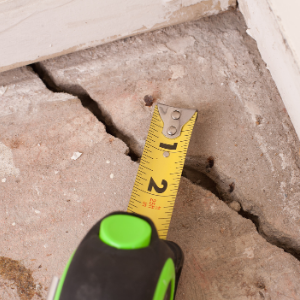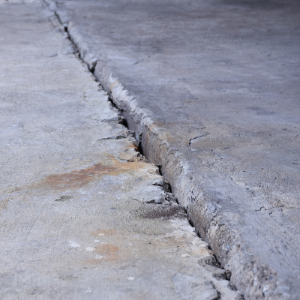
Selling a house with foundation issues in Raleigh, NC, might seem daunting, but it doesn’t have to be. Understanding local market dynamics and having the right strategy can make all the difference. Whether you’re dealing with minor cracks or more severe structural problems, this guide will help you navigate the complexities of selling your home. Explore practical solutions to ensure a smooth sale, such as negotiating repairs or setting the right price, and discover how to appeal to buyers even when facing foundation challenges unique to the North Carolina housing market.
Key Highlights
- Foundation issues in Raleigh need strategic planning to manage potential legal and financial impacts during the sale process.
- Recognizing signs of foundation problems early, like cracks and uneven floors, is crucial for maintaining home value.
- Selling as-is and offering repair credits might attract buyers interested in fixer-uppers, balancing costs and sale time.
- Transparency about foundation problems and marketing a home’s strengths can enhance buyer trust and appeal.
- Professional inspections and thorough disclosure practices help prevent legal challenges and streamline negotiations in North Carolina.
Understanding Foundation Issues: An Essential Guide for Home Sellers
Foundation issues can be daunting for homeowners looking to sell their properties. Addressing these problems is crucial in maintaining the value of your house and ensuring a successful sale. This guide will explore identifying foundation concerns and what they mean for you as a homeowner. Understanding these factors is essential, especially in Raleigh, North Carolina, where unique soil conditions exacerbate foundation settlement and damage. By gaining insight into potential foundation problems, you can prepare for real estate transactions and navigate the complexities of selling a home with foundation issues.
Identifying Foundation Issues in Your Home

Recognizing foundation issues early is vital to preventing extensive damage to your home. Common signs of foundation problems include cracks in walls, uneven floors, and doors or windows that don’t close properly. These symptoms could indicate foundation settlement or more severe concerns. For homeowners in North Carolina, it’s essential to understand regional factors like the clay content in soil, which often leads to foundation shifting. A foundation inspection can provide a thorough assessment, highlighting any underlying issues that might require attention before entering the real estate market.
Identifying foundation issues should begin with a visual examination of your home. Look for signs such as gaps around exterior doors or windows, which could indicate that the foundation is shifting. Additionally, wall cracks, especially in corners or around windows and doors, might suggest movement in the foundation. In some cases, you might hear noises of creaks or feel unusual drafts, hinting at possible structural shifts. While these observations can give you a preliminary understanding, a professional foundation inspection will offer a detailed analysis and help identify all potential problems.
Homeowners often overlook foundation damage, especially if it’s subtle. However, addressing these problems early can save on costly repairs and enhance your property’s appeal to potential buyers. Understanding the cost and implications can be crucial when foundation repair is necessary. Knowledge about common foundation issues, such as settlement or bad foundation, equips you better for negotiating with buyers and ensures transparency during sales. By proactively identifying and fixing foundation concerns, you’re more likely to maintain the selling price of your house and facilitate a smoother transaction process in the competitive North Carolina real estate market.
If the idea of fixing costly foundation damage feels overwhelming, remember you can always work with Cardinal Home Buyers, who buy houses for cash in Raleigh and even Fayetteville, NC. They make fair, hassle-free offers so you don’t have to worry about lengthy repairs or negotiations.
Foundation Concerns: What Do They Mean for Homeowners?
Foundation concerns can significantly impact the value of your home and your ability to sell. Issues like foundation settlement, bad foundation, and severe cracks can deter potential buyers, leading to decreased offers and prolonged time on the market. In North Carolina, where homes are subjected to variable climate conditions and soil types, understanding the implications of foundation problems is crucial for homeowners. These foundation issues can lead to a domino effect, causing additional structural damage if not addressed promptly.
Foundation issues not only affect the structural integrity of your house but also complicate the legal and financial aspects of selling. If you know of any foundation problems, you must disclose them to potential buyers per North Carolina’s real estate laws. Failing to disclose can lead to legal challenges, which might delay or even void the sale. Additionally, visible foundation damage can significantly alter a buyer’s perception, resulting in lower offers or the need for renegotiation.
Taking proactive steps can make a significant difference when selling a home that needs repairs. Scheduling a professional foundation inspection and obtaining a repair estimate helps homeowners understand the severity of the damage and plan accordingly. These steps provide transparency and help set realistic expectations with buyers. In some cases, completing repairs before listing can increase your property’s value and lead to faster sales. If repairs aren’t possible, however, pricing the home appropriately based on its condition can still attract the right buyers, especially cash investors looking for value opportunities.
Educating yourself about foundation repair options, from minor fixes to major repairs, is essential. This knowledge empowers you to engage in informed discussions with potential buyers, negotiate better deals, and explore strategies to market your home despite foundation concerns. Remember, transparency and preparedness are critical in real estate transactions, particularly when selling a home with known foundation issues in North Carolina.
Should You Sell Your Home As-Is with Foundation Problems?
Selling a house with foundation issues can be a complicated decision. Many homeowners in North Carolina struggle with whether to sell their property as-is or invest in repairs. Selling a home with unresolved foundation problems can lead to reduced offers, longer time on the market, and even legal implications. However, avoiding costly repairs and quickly moving forward might be appealing. Understanding the pros and cons of each option, navigating the real estate market, and dealing with foundation concerns can help you make an informed choice when selling in Raleigh, NC.
Pros and Cons of Selling Without Repairs
Choosing to sell a home as-is, without making any repairs to the foundation, comes with a number of operational and financial risks that need to be carefully considered. The main benefit is that you won’t have to pay for repairs right away. In North Carolina’s residential markets, this can save you thousands of dollars because the clay-rich subsurface is a common cause of settlement. By skipping the remedial work, the sales process goes faster because it cuts out the long scheduling and construction phases. This lets the homeowner list the property at the same time as making the decision.
But the plan does come with some real costs. Changing the buyer’s view of the value of the property is the most direct financial burden. Buyers often think that problems with the settlement are linked to a basement that needs a lot of work, and warranties that come with the sale usually give a big discount, whether it’s legal or not. Because of this, offers made after an inspection can be very different from what an orderly market would expect. Also, the buyer’s demographic is limited to a group that is willing to pay for or take on repairs that are not immediately necessary. This group is smaller in markets that rely on traditional down payments and quick insurability, which is a trend seen in Raleigh and other buyer-driven markets. The longer average days on the market that can be seen increase carrying costs and obligations, and they can also make the market tired, which makes the negotiation position even weaker.
Also, an as-is listing means that the seller has to be completely honest. The real estate laws in North Carolina clearly state that the seller must tell potential buyers about any known problems with the foundation. If you don’t follow the rules, you could face serious legal consequences, such as having to pay damages or canceling the deal. So, all the paperwork related to the foundation problem—mostly repair estimates, previous inspection reports, and repair estimates—should be shown to potential buyers. This kind of early openness lowers the risk of future claims, boosts buyer confidence, and might speed up the negotiation process.
A seller’s choice to sell without making repairs depends on their own financial situation, operational deadlines, and the state of the market. An as-is disposition may speed up the sale and save the seller money on repairs, but the seller should be ready for a longer marketing period and different buyer expectations. A careful look at these factors will help the seller come up with a strategic plan that fits with their overall financial and personal goals in the current real estate market.
If you’d rather skip repair costs and move forward quickly, selling directly to a professional cash buyer is often the easiest path. Cardinal Home Buyers specializes in buying problem properties and can close in as little as a week. That means you can sell your North Carolina house fast without waiting for traditional buyers who may be hesitant about foundation concerns.
Navigating the Real Estate Market with Foundation Issues
If you want to buy a house in Raleigh, NC, that has a foundation problem, you need to plan carefully and make smart decisions. Because the local terrain and subsurface profiles are well known to make homes more likely to have these kinds of problems, it is important to give accurate estimates of property value and appeal. People who buy in the region may already have some expectations about foundational risk. This means that balanced marketing that highlights good features while also pointing out flaws is very important.
Working with real estate agents who know a lot about properties with known structural problems is helpful. Veteran agents know a lot about the market, which helps them set the right prices, market to buyers who are interested in properties that need work, and negotiate possible foundation repairs. These professionals know all about North Carolina’s disclosure rules, so they can protect the seller from the risk of future lawsuits. Also, because they have been in charge of the local market for a long time, they have a clear picture of potential buyers who can fix structural problems.
To successfully sell such a property, you also need clear and complete paperwork. Along with the marketing materials, buyers should also get a detailed foundation inspection report from a licensed engineer and a list of repair costs. This kind of openness builds trust, speeds up contract talks, and lowers the chances of disagreements about the property’s hidden flaws.
Imaginative marketing is a part of selling structurally compromised properties that is often overlooked. Focusing on secondary features, like being close to civic amenities, having logical traffic patterns, or having unique stylistic touches, can attract buyers even if the structure has problems. For example, homes in well-liked Raleigh neighborhoods or those with publicly listed amenities like parks and schools with high ratings often make potential buyers think about the cost of structural repairs as part of a story about how their home’s value will rise over time.
To sell a home with slab or settlement-related problems quickly and easily, you need to be honest, have a strong marketing plan, and carefully consider the home’s net present value. With accurate comparables, insights into the history of permits, and carefully planned financing options from their agency, celebrities can then list, count, and mercifully market the deficit to get rid of unnecessary advice and, once the deal is done, These safe terms are in line with returns that fix market confidence.
The Impact of Foundation Issues on Your Home’s Sale Value
Foundation issues can significantly affect the sale value of your home, particularly in areas like Raleigh, North Carolina. Buyers are often wary of houses with foundation problems due to potential underlying repairs and structural instability. As a homeowner, understanding these concerns is crucial. Addressing how foundation issues influence buyer perception and calculating the trade-off between repair costs and price reductions can guide you in making informed decisions to maximize your property’s value in the real estate market.
How Foundation Problems Affect Buyer Perception

When selling a house, how buyers see the property is very important in figuring out its value and appeal. Potential buyers often get scared when they see foundation problems like settlement cracks or floors that aren’t level. These problems point to current structural problems and hint at more damage that might need big repairs. These worries are even bigger in North Carolina, where the soil can make foundation shifts and settlement worse. People who buy homes in this area are usually more careful because they know that repairs can be expensive and time-consuming.
Problems with the foundation often make fewer people want to buy the house. A lot of buyers think that repairs to the foundation mean that the house has problems that aren’t obvious, and that keeping it in good shape might cost a lot more than they thought. This widespread view can make people much less interested in the property, which means sellers have to accept lower offers or wait longer for it to sell. For first-time buyers or people who aren’t used to big repair jobs, fixing the foundation can be especially scary, so they might look for properties that are already in good shape instead.
Also, homes with obvious foundation problems often have other problems that make them less attractive, like cracked walls or doors that don’t line up, which can make the house less charming and less likely to sell. These visual cues could be seen as immediate red flags by potential buyers, which could lead to more thorough inspections and appraisals of the property. Because of this, the home’s market value could be appraised lower, making it harder to negotiate and do business. To get a buyer, sellers may need to lower the asking price a lot or think about giving credit toward repairs to make the house more appealing.
Even with these problems, being open about foundation issues and taking steps like getting reliable repair estimates can help build trust. Giving potential buyers detailed inspection reports shows that you are honest, which can ease their worries. Also, working with knowledgeable real estate agents who have done these kinds of deals before can help set prices that are both competitive and realistic. This will help attract buyers who are likely to want to do renovations. Sellers can get around the problems and issues that come up by managing these perceptions well and making sure they get good sales results.
Estimating the Cost of Foundation Repairs vs. Selling Price Reductions
When homeowners are dealing with structural damage, deciding whether to fix the foundation or take a discount at the closing table requires more than just a quick look at their finances. Repairs can be anything from small changes to major ones, and the costs can range from moving stormwater to building a full underpinning system. Because North Carolina has a lot of clay and it moves around in cycles, the exercise is even more important in the region because homeowners have to balance how their homes look, how their lenders look at them, and their desire to build equity.
Cosmetic fixes like sealing cracks, changing the level of mulch, and re-grading gutters can cost in the low hundreds, while excavation, inserting steel or helical dowels, and building custom piers can cost six figures. Many brokers suggest getting at least three estimates from licensed, sworn, and insured professionals as a way to protect yourself. These create a credible baseline by comparing the seller’s current and unresolved structural problems to similar sensitive yields in local comparables and using the results to figure out the expected net.
All three parties—the counselor, the lender, and the seller—agree that either option—reinforce and list or discount and list—puts the homeowner in a fight against soil, clay, and the market. The clearer the documented cost pipeline is compared to projected net and procurement-rate references, the more it determines at closing whether incurred costs and margin erode equity to unusable slab depth or whether net proceeds take the higher slab and equity horizon.
Homeowners may find that fixing foundation problems before putting their home on the market can lead to a higher final sale price and a shorter marketing period in some cases. When repairs are shown on the property disclosure, the seller takes away a big reason for buyers to hesitate, which makes the structure seem more stable. This benefit is even greater in markets with low inventory, where potential buyers prefer homes that are ready to move into right away over homes that need repairs that may or may not happen in the future. In these situations, the initial cash outlay for fixing the foundation can be made up for—if not more—by a faster sale and by the higher price that a buyer is willing to pay, knowing that the seismic framework is solid.
If the total cost of fixing the foundation is too high for the homeowner to afford, changing the price may be a good tactical move as well. The seller needs to figure out how much the repairs will cost and, if necessary, add a small amount for the buyer’s expected disruptions in order to come up with a fair offset. It’s a good idea to hire a licensed agent because they can compare the proposed new price to similar sales in the same price range and geographic area. This will make sure that the new price is fair and appealing in a housing market that is still very competitive in the Tar Heel area.
Another option is to give buyers repair credits at closing, which lets them choose when to do the repairs. This mechanism can make the property more appealing, especially to buyers who see repairs as a way to quickly build equity or lower the effective cost of buying. When you compare the cost of basic repairs to the expected drop in sale price, you need to use both numbers and strategy. This means that the seller needs to be aware of both the current state of the market and how buyers feel. By carefully looking at these factors, the proposed sale mechanism can be adjusted to fit the seller’s risk-reward profile, which will get them the highest possible net return while keeping their market exposure to a minimum.
Marketing Strategies for Selling a House with Foundation Problems
Selling a house with foundation issues requires a nuanced marketing strategy that addresses potential buyer concerns while emphasizing the property’s strengths. In Raleigh, NC, where unique soil conditions often lead to foundation challenges, being proactive and transparent can turn a potential obstacle into a selling point. Focusing on positive aspects and targeting the right audience can attract interested buyers and achieve a successful sale. This section explores how to highlight the property’s favorable features despite foundation concerns and effectively market to buyers seeking fixer-upper opportunities.
Highlighting Positive Aspects Despite Foundation Concerns
When you list a property that has foundation problems, the first thing you should do is change the way you talk about it. Instead of focusing on the flaw, start with the location and point out the things that the foundation does not affect. In North Carolina, professionals will quickly agree that a good address—especially one that makes it easy to get to busy job centers like Raleigh, has access to top-notch public and private schools, and has amenities that make everyday life easier—can help people feel better about risks like structural uncertainty. The value of a place is shaped just as much by how close it is to the city and how easy it is to walk to stores as it is by brave assessments of the soil below. Use these advantages of the location to build a defensive perimeter around the defect.
Aside from the geospatial argument, the house’s immediate charms are still the most important thing. Focus on architectural details that time hasn’t ruined: an English boxwood tree along the walkway, exposed beams that speak and don’t whimper, or kitchen cabinets that glow when chandeliers are dimmed. Use high-quality photos and an illustrated virtual tour to show off the property in a way that goes beyond just its usefulness. Focusing on the differences between conditions, families can rely on enfranchisement, like bringing back vegetable blooms on the porch or relaxing in period-appropriate rail chairs. Make these short stories an atlas of hours of waiting, putting an end to fear in order to stay emotionally present.
Also, creating a culture of openness is important for building trust with potential buyers. Provide detailed documentation, such as the most recent home inspection reports and specialized evaluations of the foundation’s condition, so that buyers can understand the full scope and details of the problem. Stress repairs that have already been made and explain why more major maintenance is unlikely. This will make buyers feel more confident that the property has been well cared for and will ease their concerns about the investment.
Another way to do this is to focus on the property’s hidden potential. Encourage buyers to think about all the possible outcomes after the repairs are done. For example, show that fixing the foundation could significantly raise the market value of the home. Present repair cost breakdowns and projected post-renovation appraisals to show that the property is a chance to improve its value rather than a problem that needs to be fixed. By consistently using these marketing strategies, sellers can highlight the home’s lasting benefits and make it seem like a good buy even though the foundation is currently having problems.
Legal Considerations: Disclosure and Negotiation
Selling a house with foundation issues in North Carolina involves navigating legal considerations and structuring negotiations to ensure a fair deal. Homeowners must understand the state’s disclosure requirements and effectively communicate foundation problems to potential buyers. Successful negotiation can mitigate buyer concerns, leverage repair options, and result in mutually beneficial agreements. This section will explore disclosure regulations specific to North Carolina’s real estate market and provide strategies for negotiating with buyers to strike the right deal, ensure compliance, and maximize sale potential.
Understanding Disclosure Requirements in North Carolina

When there are problems with the foundation, it is especially important for sellers in North Carolina to know the laws about real estate disclosure. According to the North Carolina Residential Property Disclosure Act, sellers must tell buyers about any structural problems they know about. This is to help buyers make informed decisions and make the buyer-seller relationship clearer. If a seller misses or incorrectly reports this information, the possible consequences—such as lawsuits and the possible cancellation of the sales contract—show how important it is to follow the law closely.
There is no doubt that foundation defects are important facts. Any detail that could change a buyer’s mind about buying the property or the price they are willing to pay is a material fact. Because of this, sellers must tell buyers not only that there are problems with the foundation, but also when they were fixed, what kind of work was done to fix them, and summaries of expert evaluations. Providing this level of detail does more than meet legal requirements; it builds buyer trust, speeds up the review process, and reduces disagreements during negotiations. This is because the market is increasingly rewarding honesty about important property issues.
For homeowners in North Carolina, scheduling a comprehensive, professional home inspection before listing the property is advisable. Such an inspection uncovers latent foundation concerns and equips sellers to evaluate repair options or formulate targeted negotiating positions. Presenting an independent, detailed inspection report enables sellers to transparently convey the severity of any deficiencies to prospective buyers, thereby minimizing the risk of adverse surprises later in the transaction. If the identified repair scope is extensive and costly, sellers can strategically incorporate the findings into property pricing or request in-lieu-of-repair credits.
Additionally, an in-depth grasp of the state’s disclosure statutes mitigates legal exposure. Maintaining a thorough log of inspection findings, subsequent repairs, and exact disclosures strengthens a seller’s position should litigation arise. This methodical documentation meets North Carolina’s statutory obligations and produces a robust, verifiable record. By embracing such proactive disclosure management, the seller expedites the sale process and cultivates a favorable marketplace atmosphere in which buyers can proceed with assurance, thus increasing the likelihood of a smooth and legally sound transaction.
Negotiating with Buyers: Striking the Right Deal
When negotiating the sale of a home with known foundation issues, a measured strategy that blends full disclosure with a willingness to find common ground is essential. Begin the conversation by expressly validating the buyer’s apprehensions; a genuine, empathetic acknowledgment can facilitate a constructive negotiating atmosphere. Prospective purchasers typically view foundation concerns as a future liability requiring substantial remedial capital, and the apprehension is understandable.
Preemptively counter this unease by distributing the outcomes of foundation inspections and well-explained repair cost estimates. A well-assembled dossier of relevant and clear documentation affirms the seller’s candour. It equips the buyer with the data to make a reasoned judgment, laying a sound foundation for further bargaining.
Offering a sale-price remedy instead of immediate, disruptive repairs is frequently more advantageous for both parties. By conceding a credit for repair at closing rather than a complete seller-financed remediation, the seller conserves cash flow and the buyer gains the latitude to chart a remedial strategy suited to available budget and preferred contractors. Each party thus moves forward without being tethered to the opacity and transaction friction that often attend seller-organized rehabilitation.
In highly competitive resale markets like Raleigh, where foundation stories are neither rare nor uniformly dire, this credit approach frequently fosters the perception of concession without capitulation, transforming a possible stumbling block into a motivator that hastens sale. Buyers perceive the credit as a targeted reassurance that resolves financing uncertainty and, in the process, the anticipated transaction reaches the settlement table with diminished friction and increased mutual satisfaction.
Establishing a pricing strategy that is both competitive and realistic is central to effective negotiation. Therefore, sellers should undertake comprehensive market analysis—preferably in collaboration with a licensed real estate agent who knows regional price fluctuations—to assign an asking price that accurately reflects the property’s immediate condition, forecasts of deferred maintenance, and the prospective costs of essential repairs. In the North Carolina market, where a legacy of particular soil profiles renders foundations vulnerable, pricing that acknowledges but does not capitulate to market anecdote, while calibrating to anticipated buyer tolerances, can maintain an attractive inquiry level and preserve negotiation latitude.
Equally, ongoing, conscientious communication is imperative. Responding to even the most technical buyer inquiries with prompt and dispassionate candor diminishes apprehension and cultivates a tone conducive to constructive dialogue. Where the potential existence of foundational concerns is likely to inhibit enthusiasm, foregrounding compensatory assets—such as proximity to employment, adjacency to educational housing markets, or recent, thoughtfully selected refurbishments—enables the dialogue to re-centre on the aggregate value proposition.
By pairing clear, evidence-based disclosures with a strategic emphasis on the home’s meritorious attributes, sellers can engineer agreements that respect the buyer’s due diligence and still accomplish targeted sale timelines, even when the contract contours are framed within the context of latent structural vulnerability.
Selling a house with foundation issues in Raleigh, NC, can seem daunting, but with the right approach, it’s entirely manageable. By conducting a thorough inspection, you can understand the extent of the issues and decide whether to repair or sell as-is. Partnering with a knowledgeable real estate agent or managed buyer experienced with problem properties can streamline the process and increase offers. Remember, transparency with potential buyers is crucial. By being open about foundation issues and showcasing the property’s other strengths, you can find a buyer ready to see the home’s true potential.
No matter the condition of your property, Cardinal Home Buyers provides homeowners with a simple, stress-free way to sell fast for cash, helping you move forward on your own terms. Contact us at (919) 609-5173 today to get your cash offer!
Helpful Raleigh Blog Articles
- Inheriting an Inherited House with Sibling in Raleigh, NC
- What Is the Average Cost to Sell a House in Raleigh, NC?
- How Long After an Appraisal Can You Close in Raleigh, NC?
- Selling a House with Foundation Issues in Raleigh, NC
- Can You Put a Lien on a House in Raleigh, NC
- Selling a Home that Needs Repairs in Raleigh, NC
- Can I Sell My House Below Market Value in Raleigh, NC
- Is Raleigh, NC Safe?
- Raleigh, NC Neighborhood Map
- Raleigh, NC Property Tax Rate
- Closing Costs Calculator in Raleigh, NC
- Understanding Expenses in Raleigh, NC
- Discover 40 Free Things to Do in Raleigh, NC
- Tips for Selling Your Raleigh Investment Property in NC

